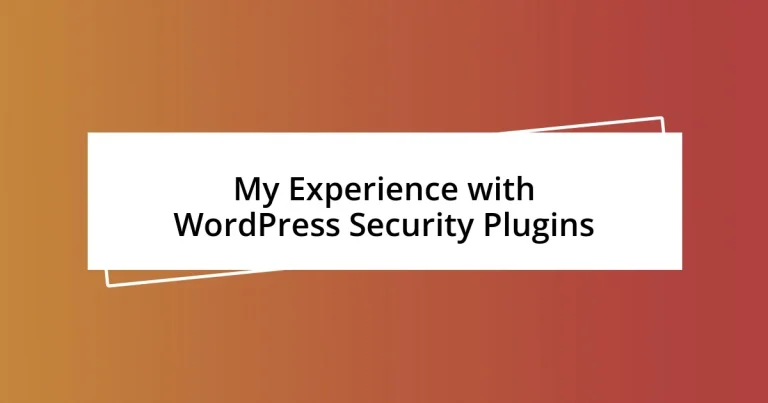Key takeaways:
- Choosing the right WordPress security plugin is crucial; consider features like user-friendliness, support, and comprehensive protection against threats.
- Regular maintenance, including updates and log reviews, is essential to maintain website security and monitor potential vulnerabilities.
- Implementing two-factor authentication and maintaining reliable backups significantly enhances website safety and provides peace of mind.
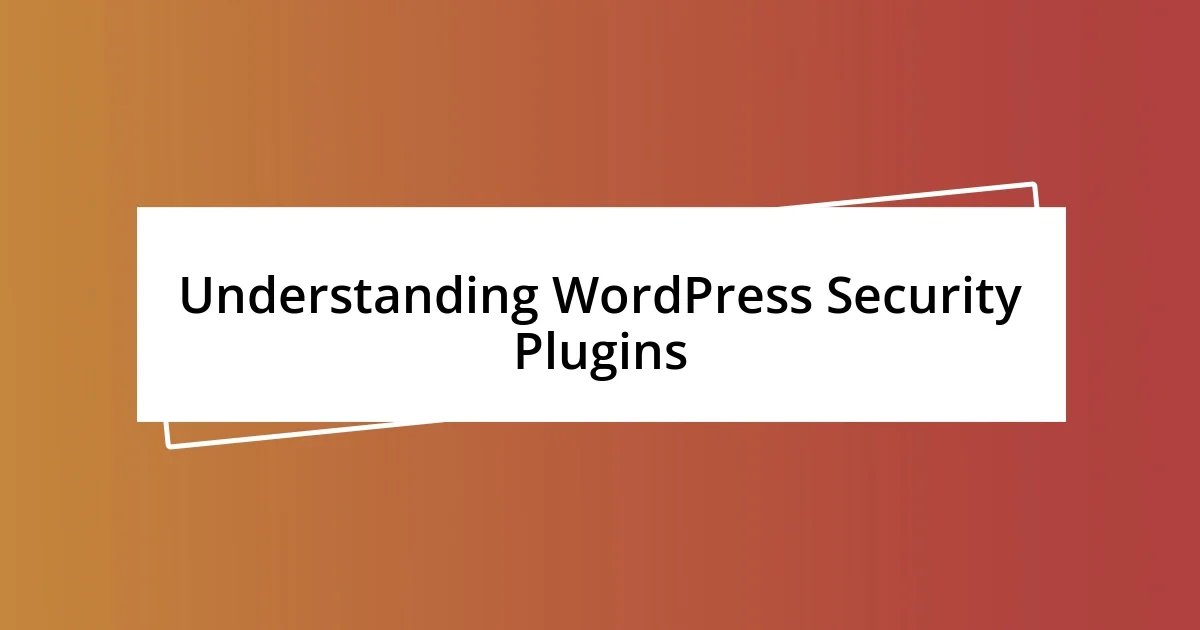
Understanding WordPress Security Plugins
WordPress security plugins are tools that help protect your website from malicious attacks and vulnerabilities. I remember feeling a wave of relief when I installed my first security plugin; it felt like securing the doors and windows of my online home. Have you ever experienced that unsettling feeling of vulnerability online?
Each plugin operates differently, offering various features like firewall protection, malware scanning, and brute force attack prevention. One plugin I tried even provided real-time security notifications, which kept me informed and proactive. It’s fascinating how these tools can transform your approach to website safety, prompting you to take security seriously rather than just leaving it to chance.
Choosing the right security plugin can be a bit daunting, given the multitude of options available. I once spent hours reading reviews, unsure which one would serve my needs best. It made me realize that understanding what each plugin offers is crucial—what works brilliantly for one site may not fit another, right? So, what features do you prioritize when looking for a security solution?
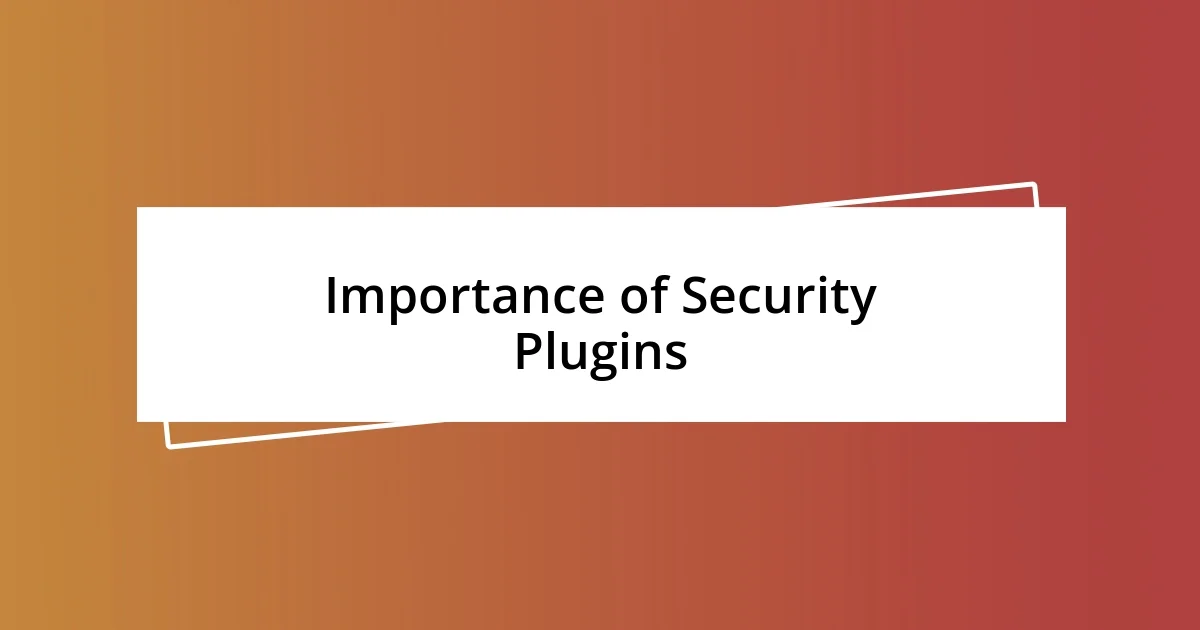
Importance of Security Plugins
Investing in a good security plugin is essential for any WordPress website owner. When I first launched my site, I felt exposed without any protective measures in place. The moment I discovered a reliable security plugin, it was as if a shield appeared around my website, significantly reducing my anxiety about potential threats.
Security plugins not only protect against hacking and malware, but they also help with SEO by ensuring that your site runs smoothly and isn’t flagged by search engines. Once, I faced a significant drop in traffic after a security breach. That experience was a stark wake-up call, highlighting how important it is to have these tools in place before a situation arises.
The peace of mind that comes from knowing your site is protected is truly invaluable. Security plugins provide continuous monitoring, which allows you to focus on content creation without worrying about breaches. In my experience, having that extra layer of security has elevated my overall website management experience—helping me remain proactive instead of reactive.
| Feature | Benefit |
|---|---|
| Firewall Protection | Blocks malicious traffic |
| Malware Scanning | Detects and removes harmful software |
| Brute Force Prevention | Stops unauthorized login attempts |
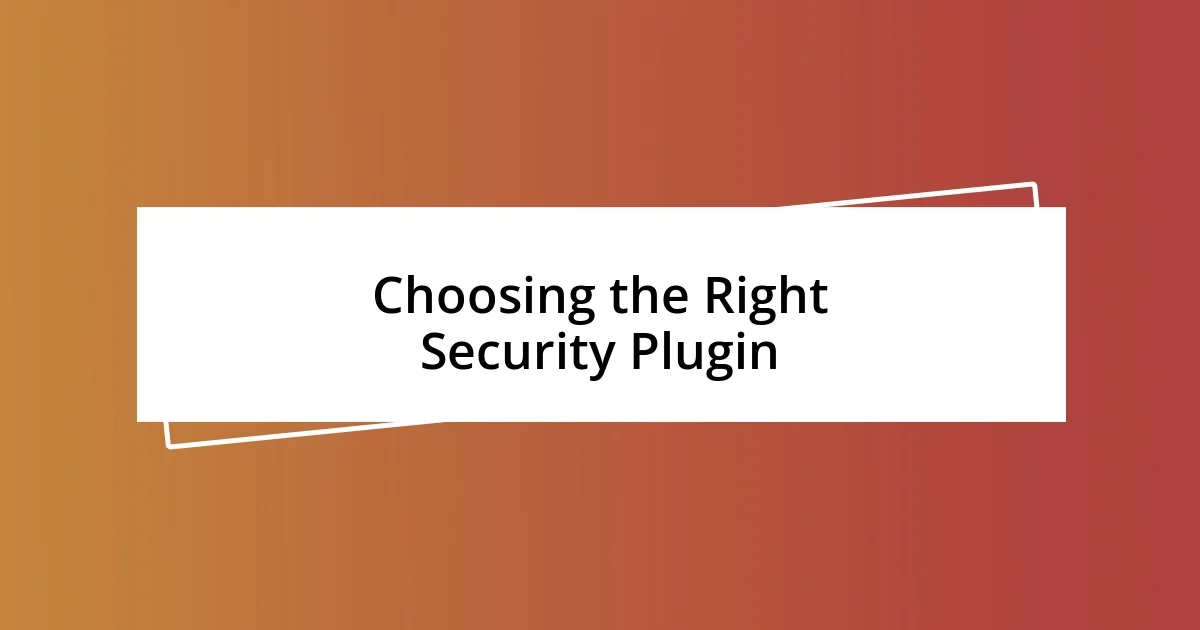
Choosing the Right Security Plugin
Selecting the right security plugin can feel overwhelming, but reflecting on my own experiences can yield meaningful insights. There was a time when I impulsively chose a plugin based on a flashy advertisement, only to discover it lacked essential features like automatic updates and support. The frustration that followed taught me that digging into the details—checking user reviews and ensuring compatibility with my hosting environment—makes all the difference. I recommend considering these critical factors when making your choice:
- User-Friendliness: An intuitive interface saves time and sanity.
- Support and Updates: Regular updates and accessible support ensure your plugin adapts to emerging threats.
- Comprehensive Features: Look for coverage against a range of threats, such as malware and hacking attempts.
Not all security plugins are created equal; I’ve learned this through trial and error. My journey took me from one plugin to another, each promising the moon but not delivering. It was during this exploration that I realized how vital it is to evaluate my specific needs. For instance, after a minor attack, I prioritized plugins with strong customer support and features like two-factor authentication. Think about what you truly need—what weaknesses does your site have? What peace of mind do you seek? This mindset will guide you toward the perfect match for your security requirements.
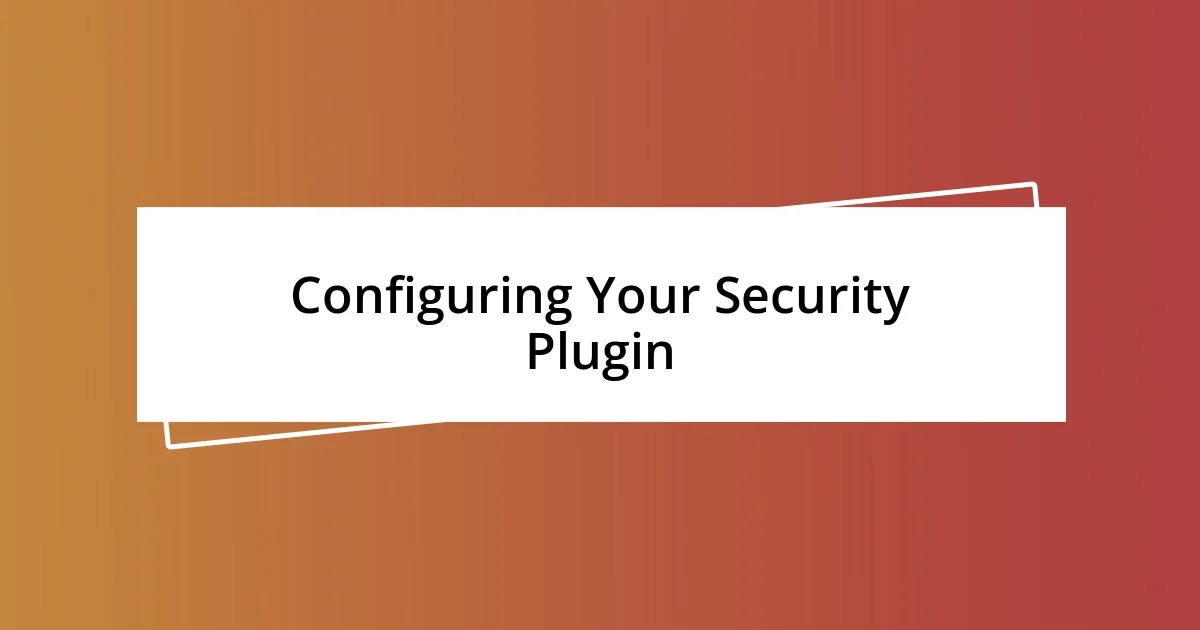
Configuring Your Security Plugin
Configuring your security plugin is an essential step that can either make or break your site’s defense. I remember the first time I set up a plugin; it felt like solving a puzzle. I meticulously walked through each setting, but I still had my doubts—were the defaults enough? To ease my worries, I researched best practices and found that customizing options like firewall settings and login attempts can provide added layers of security tailored to my site’s unique needs.
One of the most rewarding aspects of configuration is the moment you realize the power at your fingertips. For example, adjusting the automated malware scans to run at specific intervals helped me catch vulnerabilities early on. Initially, I noted a drop in performance after implementing some security measures, which made me anxious. However, fine-tuning these settings actually enhanced my site’s speed and resilience. I learned firsthand that a meticulous approach to configuration can create a harmonious balance between security and performance.
Don’t overlook the importance of regular updates in your configuration process. When I first launched my website, I neglected to activate automatic updates for my security plugin. This oversight taught me a valuable lesson; one day, I logged in to find my site had vulnerabilities due to outdated protection. Now, I can’t stress enough the significance of keeping everything current. Are you taking the time to check for updates regularly? Trust me, investing this effort pays off in the long run, ensuring you stay one step ahead of potential threats.
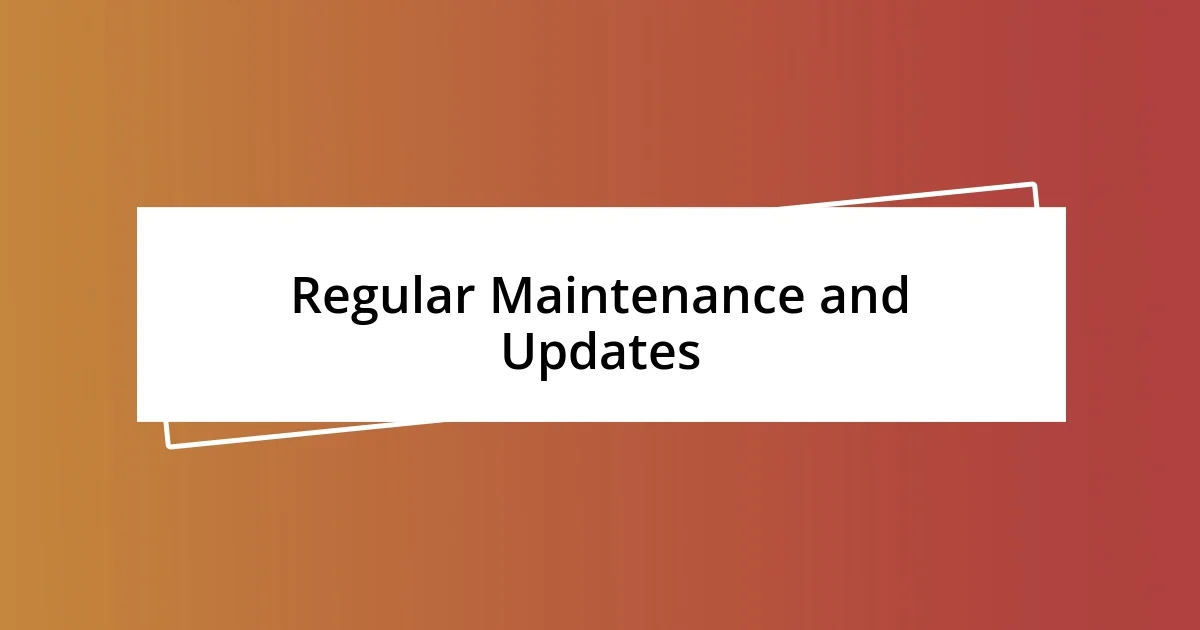
Regular Maintenance and Updates
Regular maintenance and updates of your WordPress security plugin are non-negotiable if you want to safeguard your site effectively. I recall a period when I got sidetracked by creating content and forgot to check for updates. I thought everything was fine until I received an email alerting me to a discovered vulnerability in my plugin. That moment was a wake-up call—my peace of mind relied heavily on staying current with updates.
The frequency of updates can be a dull topic, but I absolutely prioritize them now. Each time an update is available, I feel a mix of anticipation and relief. It’s like knowing I’ve locked all the doors before leaving home. I also make it a habit to log my updates in a simple spreadsheet, which helps me keep track and reminds me of critical revisions that may have introduced extra layers of protection. Doesn’t it feel comforting to know you’re actively defending your space online?
In addition to updates, regular maintenance tasks such as reviewing your security logs can give you deeper insight into your site’s health. I’ve found that regularly checking these logs has revealed some unusual patterns that, at first glance, I might have brushed off. By being proactive and diving into these details, I’ve managed to catch potential issues before they escalated. How often do you check your logs? Taking this small step can mean the difference between a close call and a significant breach.
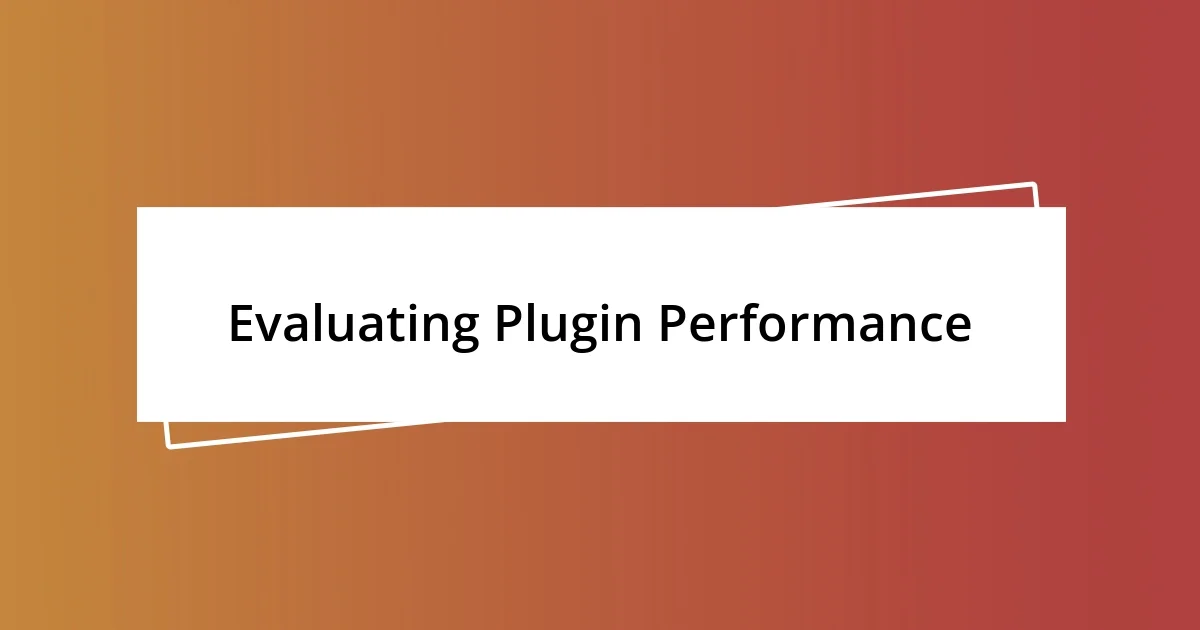
Evaluating Plugin Performance
Evaluating the performance of your security plugin is crucial to maintaining a healthy website. When I first installed a security plugin, I was eager to see its effects on my site. Yet, after some time, I noticed that page loading speeds were sluggish. I couldn’t help but wonder: was my security plugin part of the problem? To address this, I started using website speed tests to gauge performance before and after changes, leading me to discover which features were worth keeping.
In my experience, finding the right balance between stringent security and site speed can feel like walking a tightrope. Once, I disabled a specific feature that seemed to bog down my site without sacrificing security. The boost in speed was astonishing! I often remind myself that not every feature fits every website. Have you evaluated which elements of your plugin contribute most to your security? Knowing which configurations can be adjusted without compromising safety is a game changer.
Additionally, I’ve learned that user feedback can be invaluable in evaluating plugin performance. Speaking with fellow website owners revealed varying experiences with the same plugin. One friend mentioned she had issues with a different plugin conflicting with her theme, something I never encountered. This made me realize that performance can be subjective and depend heavily on individual site setups. Engaging with the community for advice can open your eyes to potential pitfalls. Have you reached out for insights? Sometimes, a simple question can unveil a wealth of knowledge.
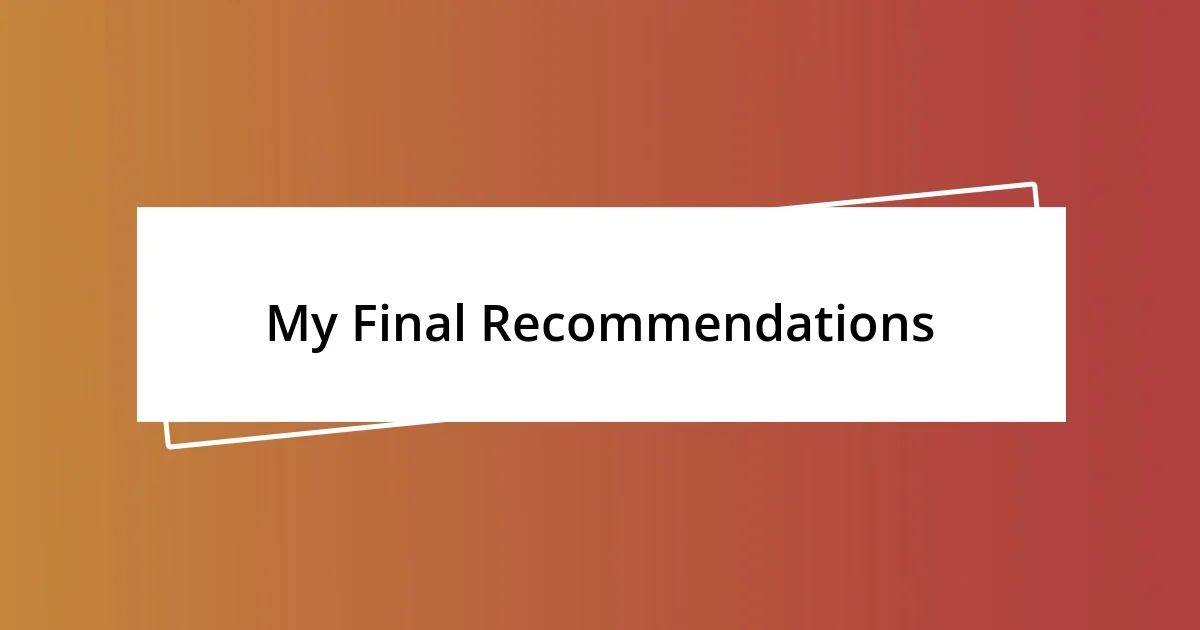
My Final Recommendations
When it comes to choosing security plugins, I highly recommend testing a few options before settling on one. I vividly remember experimenting with different plugins during a critical time. After trying out three different ones, I finally found the right fit. That’s because the right plugin not only secured my site but also enhanced my confidence in managing it. Have you found a plugin that feels just right for your needs? Sometimes, it takes a bit of trial and error, but well worth the effort.
Another tip I stand by is to prioritize two-factor authentication (2FA) in your security strategy. I was slightly hesitant at first, thinking, “Is this really necessary?” However, once I implemented it, I realized how much peace of mind it brought me. It felt liberating to know there was an extra layer protecting my site. If you haven’t enabled 2FA yet, I encourage you to do so—you’ll thank yourself later for that added sense of security.
Finally, I can’t stress enough the importance of backups. I experienced a hair-raising scare when I lost an entire week’s worth of content due to a plugin conflict. Thankfully, my backup system saved me, restoring my site almost seamlessly. That experience taught me to never take my backups for granted. Do you have a reliable backup system in place? Regularly scheduled backups can minimize the stress of potential disasters, allowing you to focus on what truly matters: creating great content.












